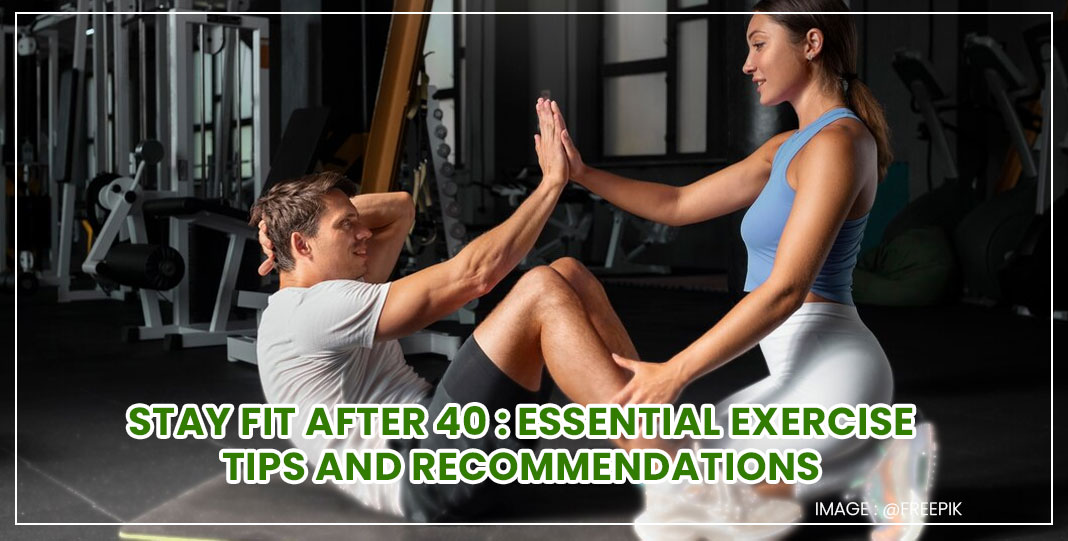
Fitness Over 40: Expert Exercise Recommendations to Stay Healthy
Regular physical activity is essential for maintaining fitness and overall well-being, particularly as we age. Here are some exercise guidelines tailored for individuals over 40:
- Cardiovascular Exercise: Strive for a minimum of 150 minutes per week of moderate-intensity aerobic exercise or 75 minutes per week of vigorous-intensity aerobic exercise. Options like brisk walking, cycling, swimming, or jogging promote heart health, endurance, and weight management.
- Strength Training: Integrate strength training into your routine at least twice weekly, targeting major muscle groups like the legs, hips, back, abdomen, chest, shoulders, and arms. Strength exercises help preserve muscle mass, boost metabolism, and enhance bone density, reducing the risk of osteoporosis.
- Flexibility and Balance Work: Dedicate time to stretching exercises at least two to three times weekly to enhance flexibility and balance. Practices such as yoga, Pilates, or tai chi can improve mobility, reduce stiffness, and prevent falls.
- Low-Impact Options: If you have joint concerns or prior injuries, explore low-impact activities such as swimming, water aerobics, elliptical training, or cycling, which provide effective workouts without undue strain on the joints.
- Core Strengthening: Focus on exercises that engage the core muscles, including the abdominals, obliques, and lower back. Strengthening the core enhances posture, stability, and overall functional fitness. Planks, bridges, and stability ball exercises are beneficial.
- Interval Training: Integrate interval training into cardiovascular workouts to boost intensity and calorie expenditure. Alternating between high-intensity bursts and recovery periods enhances cardiovascular fitness and metabolism.
- Listen to Your Body: Pay attention to your body’s signals and address any discomfort or pain promptly. Balancing exercise with adequate rest and recovery is crucial. Consult a healthcare professional if you experience persistent discomfort.
- Hydration and Nutrition: Maintain hydration by consuming ample water daily and fuel your body with a balanced diet rich in fruits, vegetables, lean proteins, and whole grains to support your exercise regimen and overall health.
- Adequate Rest: Prioritize quality sleep, aiming for 7-9 hours per night to facilitate recovery and well-being.
- Consistency: Establish a consistent exercise routine, incorporating activities you enjoy and that align with your lifestyle to ensure long-term adherence and results.
- Warm-Up and Cool Down: Begin and end each exercise session with appropriate warm-up and cool-down activities to prevent injury and minimize muscle soreness.
- Intensity Adjustment: Modify exercise intensity and duration based on individual fitness levels, health status, and any physical limitations.
- Functional Exercises: Include movements that simulate daily activities to improve functional fitness and facilitate ease of movement in everyday life.
- Active Lifestyle: Incorporate physical activity into your daily routine beyond structured workouts, such as taking the stairs, walking, gardening, or household chores.
- Mind-Body Practices: Explore practices like meditation, mindfulness, or deep breathing exercises to manage stress, enhance mental well-being, and promote holistic health.
- Progress Monitoring: Keep track of your exercise progress and goals using methods like journaling, fitness apps, or working with a personal trainer to stay motivated and accountable.
- Social Engagement: Exercise with companions, join group fitness classes, or involve family and friends to enhance enjoyment, motivation, and consistency.
- Consultation: Before initiating a new exercise program, especially if you have underlying health concerns, seek guidance from a healthcare provider or qualified fitness professional to ensure safety and suitability.
- Routine Flexibility: Remain open to trying new activities and varying your exercise routine to prevent monotony and optimize results.
- Enjoyment and Commitment: Embrace exercise as a lifelong journey, finding fulfillment and satisfaction in the process. Celebrate achievements and maintain dedication to long-term health and well-being.
Read more: